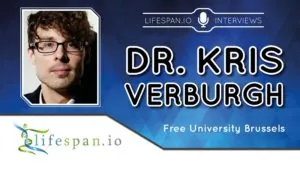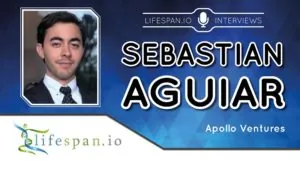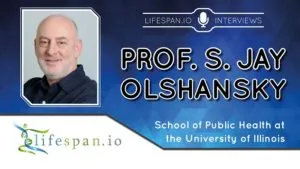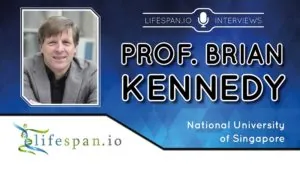2019 is quite a milestone for LEAF; this will be our fourth year of bringing you the latest industry news, organizing online events, hosting our annual conference in New York, and crowdsourcing important research projects over at Lifespan.io. We have been incredibly busy and, as has been customary in previous years, we will be taking a look back at the year.
January
YouGov conducted a survey determining that younger Americans are more interested in longer lives, and indefinite lifespans, than their older counterparts.
LEAF Activities
 We conducted a pair of conflicting interviews: one with Dr. Kris Verburgh, an optimist who believes in the potential of AI to revolutionize medicine, and one with Dr. Leonid Peshkin, who is completely in favor of rejuvenative therapies but has a less optimistic view of the future of our industry.
We conducted a pair of conflicting interviews: one with Dr. Kris Verburgh, an optimist who believes in the potential of AI to revolutionize medicine, and one with Dr. Leonid Peshkin, who is completely in favor of rejuvenative therapies but has a less optimistic view of the future of our industry.
Research
A new pathway was discovered for nicotinamide mononucleotide (NMN) to enter cells directly instead of being converted into nicotinamide riboside first.
February
LEAF Activities

In a collaboration with the Media Institute for Public Health in Russia, Outreach Director Elena Milova co-chaired the second School for Longevity Journalism. Dr. Vadim Gladyshev presented an overview of aging and the areas of research that have the most potential, and Elena along with Anna Dobryukha from Komsomolskaya Pravda shared tips on how to present this topic to the public in an understandable way.
We conducted two more interviews, both of which relate to the financial side of rejuvenation biotechnology: Kelsey Moody of Ichor Therapeutics and the investor Sebastian Aguiar had things to say about the longevity investment ecosystem.
Research
The epigenetic clock GrimAge was shown to be an effective biomarker of biological age, making it potentially useful as a tool for judging the effectiveness of rejuvenative therapies.
The removal of senescent cells from the heart was shown to be beneficial in mice, reducing hypertrophy and fibrosis.
March
We attended Undoing Aging 2019, a European conference held by the SENS Research Foundation and the Forever Healthy Foundation. This conference featured many prominent researchers discussing age-related diseases and rejuvenation biotechnology, and we discussed it on LifeXtenShow, our Youtube show featuring all things rejuvenation.
LEAF Activities
LEAF Outreach Director Elena Milova took part in “At the edge of two professions: the ethics of doctors and medical journalists”, a roundtable on medical ethics. She discussed the ways in which scientific and medical news determines how people make decisions about their own health.
April
LEAF Activities
We conducted a tremendous number of interviews at Undoing Aging 2019, and we published them the following month. Among them, Professor Judy Campisi discussed senolytics, Professor Jerry Shay discussed telomerase, and the well-known Dr. Aubrey de Grey discussed how and why he believes that things are moving faster than expected.
Research
In the brains of mice, cellular waste can be more efficiently cleared by blocking a protein called CD22, significantly reversing cognitive decline. If this can be repeated in people, it offers new hope to those suffering from age-related brain disorders.
May
At an XPRIZE meeting to determine what technologies should be incentivized in the future, LEAF president Keith Comito’s proposal of showing meaningful progress in dementia reduction by 2030 made it to the final round along with Dr. Aubrey de Grey’s proposal of limited but measurable human rejuvenation by 2032.
LEAF Activities
May of 2019 was when LEAF first launched LifeXtenShow, our Youtube video series focusing on rejuvenation biotechnology.
Research
Spiegel Lab researchers at Yale have discovered enzymes that can cleave advanced glycation end-products, which are known to contribute to the development of age-related diseases.
June
Researchers discovered a natural method of breaking down a-synuclein aggregates, which are thought to contribute to Parkinson’s disease. Discovering why and how this mechanism breaks down may lead to effective therapies for this neurodegenerative disorder.
July
As expected, July was our most important month of 2019, as we held our second annual Ending Age-Related Diseases conference. This conference featured many prominent researchers and experts in all aspects of rejuvenation biotechnology, including basic biology, financial concerns, and potential new therapeutics that can potentially ameliorate age-related diseases.
LEAF Activities
At Geek Picnic, the largest Russian popular science festival. LEAF Outreach Director Elena Milova gave a talk entitled “Demand for superlongevity: how many people on Earth are ready to crack the aging code” and participated in a panel discussion on the ethics of biohacking.This month, we published interviews with Sergey Young of the $100 million Longevity Vision fund, Dr. María Blasco of the National Cancer Research Center in Spain, and the well-known Professor George Church, whose company, Rejuvenate Bio, is working on a therapy for aging dogs.
Research
Researchers have found that T cells invade the aging brain due to inflammatory factors, curtailing neural stem cell development and contributing to cognitive decline.
A machine learning algorithm has identified 110 naturally occurring molecules that fight cancer and determined which foods contain the greatest amount of these beneficial substances.
August
While August was relatively quiet compared to the previous month, one of the most significant events for long-term progress was when Juvenescence secured $100 million in funding to develop a variety of rejuvenation biotechnology companies. The chairman of Juvenescence, Jim Mellon, had spoken at EARD2019.
The Forever Healthy Foundation launched Rejuvenation Now, an initiative to promote evidence-based decisionmaking among the rejuvenation community.
LEAF Activities
 This month’s interviews were of Dr. Daniel Ives, with whom we had an interesting discussion regarding epigenetic clocks, and Sarah Constatin, whose company, Daphnia Labs, does aging research on the tiny organisms for which her company is named.
This month’s interviews were of Dr. Daniel Ives, with whom we had an interesting discussion regarding epigenetic clocks, and Sarah Constatin, whose company, Daphnia Labs, does aging research on the tiny organisms for which her company is named.
Research
Inducing pluripotency in adult stem cells isn’t desirable, as they forget what they are and what they’re supposed to do, but knowing the different routes that cells can take to get to this state is helpful for the development of stem cell therapies.
In one of the first therapeutic uses of cellular reprogramming, researchers have successfully reversed blindness in mice due to age or injury.
September
LEAF Activities
LEAF Outreach Director Elena Milova gave a talk at the Moscow Biohacking Conference, discussing the motivation for a radically increased lifespan. She informed the audience that if people intend to live for a long time, they should deal with global issues, both environmental and social, before they become threats.
We conducted a heavily attended webinar with Dr. David Sinclair, allowing participants to ask Dr. Sinclair about his new book and his thoughts on rejuvenation in general. We had also interviewed Dr. Sinclair about his book prior to its release.
 We conducted two more interviews that month: one with demography expert Prof. S. Jay Olshansky and a highly technical one with Dr. Kevin Strange.
We conducted two more interviews that month: one with demography expert Prof. S. Jay Olshansky and a highly technical one with Dr. Kevin Strange.
Research
Intervene Immune, a company dedicated to thymus rejuvenation, released Phase 1 results showing that its approach was effective in partially restoring the thymi of older people to youthful function.
Going beyond thin-tissue organoids, a method called SWIFT was shown to generate vascular tissue, allowing for the construction of larger synthetic organs.
October
October was the month of MitoMouse, our second campaign with the MitoSENS team. In this project, mice are bred to have some mitochondrial genes present in the nucleus rather than the mitochondria, thereby proving the concept of this potential method for alleviating mitochondrial dysfunction. In one month’s time, we raised a total of $77,625 through our crowdfunding website Lifespan.io, completing all stretch goals.
LEAF Activities
We interviewed Dr. Justin Rebo of BioAge as well as Dr. Ronald Kohanski, the Deputy Director of the National Institutes of Aging.
Research
A team of scientists, including Dr. David Sinclair, discovered that the repair of genetic damage leads to epigenetic alterations, showing a close relationship between these two primary hallmarks of aging.
Gensight Biologics, which is working on a cure for the mitochondrial dysfunction that underlies the blindness-causing disease Leber Hereditary Optical Neuropathy, released further trial data. It turns out that Gensight’s approach was, in a way, too effective: the trial only treated one eye of each patient and used the other as a control, but the treatment had spread to both eyes.
November
Quite a few notable scientists teamed up to create a healthcare framework for aging populations and petition WHO to create proper diagnostic codes for age-related diseases, thereby creating endpoints for prospective treatments that prevent and cure them.
Research
 The very first CRISPR trial on human beings was used as a therapy against cancer; it began with three people and grew to encompass more.
The very first CRISPR trial on human beings was used as a therapy against cancer; it began with three people and grew to encompass more.
OSKM may no longer be the epigenetic reset cocktail of choice; one study had shown that SKM, without Oct4, may be sufficient for this reset and that Oct4 may be unnecessary and dangerous.
December
LEAF Activities
 We interviewed Professor Brian Kennedy of the National University of Singapore about rapamycin and how it relates to the mTOR pathway, and he stressed the importance of developing therapies against aging in Singapore, which is suffering from a severely aging population. We also interviewed Dr. Greg Potter, who offers practical advice on what people can do to lengthen their lives.
We interviewed Professor Brian Kennedy of the National University of Singapore about rapamycin and how it relates to the mTOR pathway, and he stressed the importance of developing therapies against aging in Singapore, which is suffering from a severely aging population. We also interviewed Dr. Greg Potter, who offers practical advice on what people can do to lengthen their lives.
It turns out that harmful changes to your gut microbiome can happen as early as your 30s, causing the onset of the age-related inflammation known as inflammaging.
This piece of research seemingly brings together two entirely disparate topics: in a basic model of aging, caloric restriction has been shown to slow genomic instability, as less stress is placed upon RNA replication machinery.
The growth of LEAF has continued throughout 2019, as we continue to publish well-read articles and scientific communication related to life extension, and we are proud to be at the forefront of this emerging industry. With your support, our site’s traffic has grown past fifty thousand readers a month, and we have grown into a sponsor of multiple successful Lifespan.io campaigns and a creator of easy-to-understand science communication videos focused on educating the public about the whys and wherefores of rejuvenation biotechnology.
If you’d like to help us in our mission of bringing us closer to a world without deadly age-related diseases, there are multiple ways to support us.
We look forward to 2020, not just for our own continued growth and our third upcoming conference, but for the critical research that has yet to be done along with the clinical trials and effective, life-saving therapies that will be developed!





